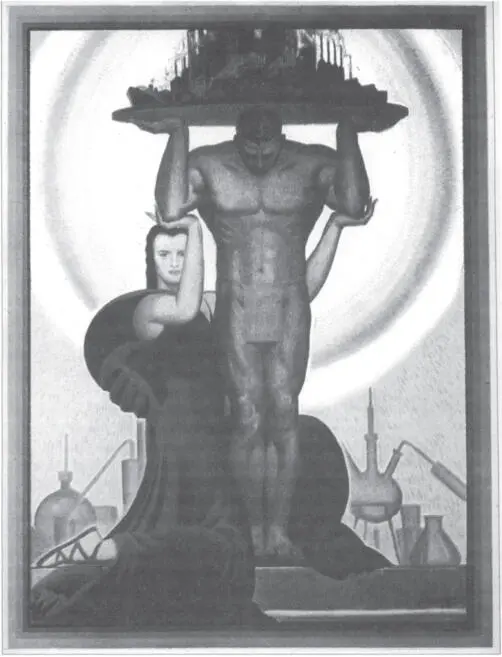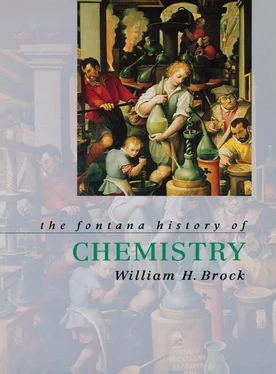
FONTANA HISTORY OF CHEMISTRY
(Editor: Roy Porter)
THE FONTANA HISTORY OF
CHEMISTRY
William H. Brock

COVER
TITLE PAGE FONTANA HISTORY OF CHEMISTRY (Editor: Roy Porter)
PREFACE TO THE FONTANA HISTORY OF SCIENCE
BIBLIOGRAPHICAL NOTE
INTRODUCTION
1 On the Nature of the Universe and the Hermetic Museum
Chinese Alchemy
Greek Alchemy
Arabic and Medieval Alchemy
Newton’s Alchemy
The Demise of Alchemy and its Literary Tradition
2 The Sceptical Chymist
Paracelsianism
Helmontianism
The Acid-Alkali Theory
A Sceptical Chemist
Boyle’s Physical Theory of Matter
The Vacuum Boylianum and its Aftermath
Newton’s Chemistry
The Phlogistonists
Conclusion
3 Elements of Chemistry
A Scientific Civil Servant
The Chemistry of Air
The Chemical Revolution
The Aftermath
Conclusion
4 A New System of Chemical Philosophy
Dalton’s ‘New System’
Dalton’s Life
The Atomic Theory
The Origins of Dalton’s Theory
Electrifying Dalton’s Theory
Chemical Reactivity
Prout’s Hypothesis
Volumetric Relations
Scepticism Towards Atomism
Conclusion
5 Instructions for the Analysis of Organic Bodies
Purity
The Basis of Chemistry
The Supply of Apparatus and Chemicals
Liebig, Organic Analysis and the Research School
Conclusion
6 Chemical Method
Classifying by Radicals
Classification by Types
7 On the Constitution and Metamorphoses of Chemical Compounds
The Establishment of Quantivalence
Kekulé and the Theory of Chemical Structure
The Triumph of Structural Theory
8 Chemistry Applied to Arts and Manufactures
The Alkali Industry
Dyestuffs and Colouring
9 Principles of Chemistry
Sorting the Elements
The Rare Earths
The Inert Gases
Manufacturing Elements
Mendeleev’s Principles
Conclusion
10 On the Dissociation of Substances Dissolved in Water
Proto-Physical Chemistry
Raoult and van’t Hoff
Electrochemistry from Faraday to Arrhenius
The Ionic Theory
The Reception of the Ionic Theory
11 How to Teach Chemistry
Frankland’s State-sponsored Chemistry
Armstrong’s Heuristic Method
Twentieth-century Developments in Teaching
The Laboratory
12 The Chemical News
Forming Chemical Societies
The Chemical Periodical
William Crookes, Chemical Editor
13 The Nature of the Chemical Bond
The Lewis Atom
Spreading the Electronic Theory
The Pauling Bond
14 Structure and Mechanism in Organic Chemistry
The Lapworth-Thiele-Robinson Tradition
The Michael-Flürscheim- Vorlãnder Tradition
The Electronic Theory of Organic Reactions
Organizing the Structure of Organic Chemistry
The Kinetics of Mechanisms
The Spread of Physical Organic Chemistry
Aromaticity
The Non-classical Ion Debate
Conclusion
15 The Renaissance of Inorganic Chemistry
Werner’s New Ideas
Sidgwick’s Electronic Interpretation of Co-ordination Chemistry
Australian Chemistry
Australian and Japanese Chemistry
Co-ordination Chemistry in Australia
Nyholm’s Renaissance
Conclusion
16 At the Sign of the Hexagon
Synthesis
Industrial Chemistry
Chemistry and the Environment
EPILOGUE
APPENDIX: HISTORY OF CHEMISTRY MUSEUMS AND COLLECTIONS
NOTES
BIBLIOGRAPHICAL ESSAY
INDEX
ACKNOWLEDGEMENTS
ABOUT THE AUTHOR
OTHER BOOKS BY
COPYRIGHT
ABOUT THE PUBLISHER

‘Chemical Industry, Upheld by Pure Science Sustains the Production of Man’s Necessities’, frontispiece to A. Cressy Morrison, Man in A Chemical World: the service of chemical industry (London & New York: Scribner’s, 1937) Reproduced courtesy of Scribner’s, Collier Macmillan, New York
PREFACE TO THE FONTANA HISTORY OF SCIENCE
Academic study of the history of science has advanced dramatically, in depth and sophistication, during the last generation. More people than ever are taking courses in the history of science at all levels, from the specialized degree to the introductory survey; and, with science playing an ever more crucial part in our lives, its history commands an influential place in the media and in the public eye.
Over the past two decades particularly, scholars have developed major new interpretations of science’s history. The great bulk of such work, however, has been published in detailed research monographs and learned periodicals, and has remained hard of access, hard to interpret. Pressures of specialization have meant that few survey works have been written that have synthesized detailed research and brought out wider significance.
It is to rectify this situation that the Fontana History of Science has been set up. Each of these wide-ranging volumes examines the history, from its roots to the present, of a particular field of science. Targeted at students and the general educated reader, their aim is to communicate, in simple and direct language intelligible to non-specialists, well-digested and vivid accounts of scientific theory and practice as viewed by the best modern scholarship. The most eminent scholars in the discipline, academics well-known for their skills as communicators, have been commissioned.
The volumes in this series survey the field and offer powerful overviews. They are intended to be interpretative, though not primarily polemical. They do not pretend to a timeless, definitive quality or suppress differences of viewpoint, but are meant to be books of and for their time; their authors offer their own interpretations of contested issues as part of a wider, unified story and a coherent outlook.
Carefully avoiding a dreary recitation of facts, each volume develops a sufficient framework of basic information to ensure that the beginner finds his or her feet and to enable student readers to use such books as their prime course-book. They rely upon chronology as an organizing framework, while stressing the importance of themes, and avoiding the narrowness of anachronistic ‘tunnel history’. They incorporate the best up-to-the-minute research, but within a larger framework of analysis and without the need for a clutter of footnotes – though an attractive feature of the volumes is their substantial bibliographical essays. Authors have been given space to amplify their arguments and to make the personalities and problems come alive. Each volume is self-contained, though authors have collaborated with each other and a certain degree of cross-referencing is indicated. Each volume covers the whole chronological span of the science in question. The prime focus is upon Western science, but other scientific traditions are discussed where relevant.
Читать дальше















